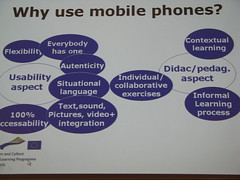
- Image by NLanja via Flickr
Illustration...
Assume you're an ER doc and a patient presents with severe bleeding from a gunshot. Of course you would do everything you can to mitigate the bleeding; slow it down; even stop it. But that's only the temporary fix to the deeper problem – the bullet.
Problem...
Education is losing vitality in several arenas. Public education suffers from lower tax revenues in a crippled economy of devalued property. They also suffer from increased competition for enrollments via charter schools and private institutions as well as new online opportunities.
Higher Ed is losing ground as well via lower endowments, lower enrollments, and increased competition from for-profits, community colleges, and online approaches.
Most are trying to slow the speed of loss (a short-term solution) just like in our earlier ER doc example. But even if they succeed in short term fixes, the long-term problem remains: Education is changing around the globe. Here's a review of the three obstacles, why they present a problem for educators, and one way they can be turned into opportunities for long term, sustainable solutions.
Obstacles...
According to many mainstream educators, Social Media is a distraction. Students check Facebook before they check email. Many dispense with email altogether unless absolutely necessary. And text messaging is harmful. An entire generation is ignorant of the skill of written communication. How are they supposed to complete book reports and turn in essays?
Mobile phones are problematic, so say many school officials, because they encourage cheating. They also distract both individuals and entire classes. And as mentioned above, they reinforce poor writing skills by encouraging 160 character text messages with emoticons rather than Ethos, Pathos, and Logos.
Money is in shorter supply and budgets are being cut across the board. How can we educate when we can't afford the equipment, technology, textbooks, desks, electricity, staff, ... and the list goes on. Therefore we inadvertently focus on fund raisers and government handouts to alleviate our pain.
"Security is mostly a superstition. It does not exist in nature, nor do the children of men as a whole experience it. Avoiding danger is no safer in the long run than outright exposure. Life is either a daring adventure or nothing." – Helen Keller
Social media has changed our world into a relationship economy. Avoiding this revolutionary platform of interaction is like avoiding the subject of Economics when teaching History, Math, or the Social Sciences, etc. Social media is made up of user generated content within a defined space. Education must adapt to this new paradigm by offering students some customization and personalization options within the curriculum.
This does not mean students decide what to learn but it could mean they are given some choices regarding sequencing when such options are viable. How about personalizing learning spaces such as furniture arrangement, location for a class one day, or choosing a teammate for a project?
Mobile phones are more ubiquitous than computers. They are the single most useful device available to the masses (Africa now has the highest per capita concentration of them) since offering access to the Internet. Students find their cell phone to be the most relevant personal belonging (Identity) they own. Yet schools ban them unless they can exert some control over their use.
It's vain to seek to destroy this perceived enemy of our traditional education process. Rather we best befriend this new platform and embrace its use because the new paradigm is about mobile delivery to a mobile generation (Remember! It's a relationship economy).
Money woes could be reduced by embracing the new paradigm. E-textbooks are a fraction of the cost of traditional bound and printed matter. Aggregated relationship feeds can be monetized by the educational institutions themselves rather than waiting for Doritos and Budweiser to do it.
(I'm expecting some to raise a fuss about such a suggestion but perhaps they are not aware of the way our students are monetized already within the obese educational institution).
What society values, it should propagate through education so the next generation may carry the torch onward. We used to value colonization and we indoctrinated others accordingly. Then we valued industrialization and we used behaviorism to educate the masses. When we entered the management revolution of the mid 20th century, we changed our tactics to cognitive learning approaches.
Today we are facing a new paradigm that requires constructivist and connectivist learning strategies to educate a sustainable society that is equipped to emerge wisely from our impending collision with a future where the human and the machine are merged in a bio- and nano-tech world.
The future will be social and mobile. If the institution of education wishes to survive economically, it must adopt and adapt the new platform of interaction. (posted 2/16/10)